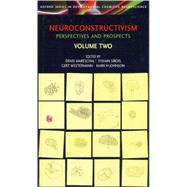
Note: Supplemental materials are not guaranteed with Rental or Used book purchases.
Purchase Benefits
Looking to rent a book? Rent Neuroconstructivism - II Perspectives and Prospects [ISBN: 9780198529927] for the semester, quarter, and short term or search our site for other textbooks by Mareschal, Denis; Sirois, Sylvain; Westermann, Gert. Renting a textbook can save you up to 90% from the cost of buying.
| Introduction | |
| Constructing visual function through prenatal and postnatal learning | |
| Learning the best first: interactions between visual development and learning | |
| Why let networks grow? | |
| Modeling cognitive developmental transitions in neural networks: bifurcations in an adaptive resonance theory model | |
| Connectionism in an artificial life perspective: simulating motor, cognitive and language development | |
| Using robots to study the mechanisms of imitation | |
| What neuro-robotic models can teach us about neural and cognitive development | |
| Phonological deficits and developmental language impairments: evidence from connectionist models | |
| A neural network model of autism: implications for theory and treatment | |
| Conclusion - the future of neuroconstructivism | |
| Table of Contents provided by Publisher. All Rights Reserved. |
The New copy of this book will include any supplemental materials advertised. Please check the title of the book to determine if it should include any access cards, study guides, lab manuals, CDs, etc.
The Used, Rental and eBook copies of this book are not guaranteed to include any supplemental materials. Typically, only the book itself is included. This is true even if the title states it includes any access cards, study guides, lab manuals, CDs, etc.